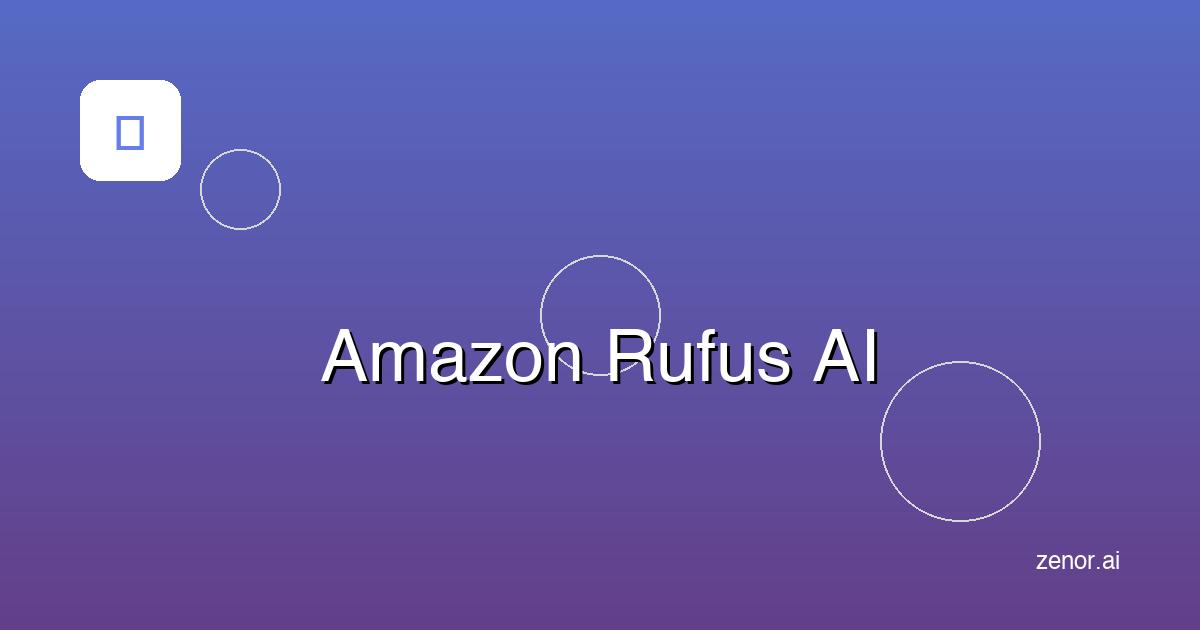Amazon’s Rufus: The AI That’s Redefining Shopping
Amazon’s Rufus AI assistant, now rolled out to millions of shoppers, represents the most ambitious implementation of conversational commerce to date. Understanding Rufus isn’t just about keeping up with Amazon - it’s about understanding where all of e-commerce is headed.
What Makes Rufus Revolutionary
Trained on Amazon’s Universe
Rufus has been trained on:
-
1 billion+ products in Amazon’s catalog
-
Hundreds of millions of customer reviews
-
Decades of purchase pattern data
-
Real-time inventory and pricing information
Beyond Simple Search
Rufus doesn’t just find products; it:
-
Understands complex, multi-part questions
-
Provides comparative analysis
-
Offers personalized recommendations
-
Explains technical specifications
-
Suggests alternatives and bundles
Real Conversations That Convert
Example Shopping Journeys
Customer: ‘I need to set up a home office for video calls’ Rufus: Provides complete setup including:
-
Webcam with ideal specifications
-
Ring light for professional lighting
-
Acoustic panels for sound quality
-
Ergonomic desk and chair options
-
Cable management solutions
-
Total budget breakdown
Customer: ‘What’s the difference between these three coffee makers?’ Rufus: Detailed comparison covering:
-
Brewing methods and taste profiles
-
Maintenance requirements
-
Long-term costs
-
User review summaries
-
Best use cases for each
The Rufus Effect on Shopping Behavior
Changed Expectations
Shoppers now expect:
-
Instant expertise on any product
-
Personalized guidance through decisions
-
Comprehensive comparisons without research
-
Predictive suggestions based on needs
New Shopping Patterns
-
47% start with conversational queries
-
3.2x more products viewed per session
-
28% higher average order value
-
62% fewer abandoned carts
How Smaller Retailers Can Compete
Advantage 1: Specialization
While Rufus knows everything, specialized retailers can offer:
-
Deeper expertise in specific categories
-
Curated recommendations from real experts
-
Community knowledge from enthusiasts
-
Local relevance and availability
Advantage 2: Personalization
Smaller stores can provide:
-
Individual attention to customer needs
-
Purchase history continuity
-
Preference learning over time
-
Human touch when needed
Advantage 3: Agility
Independent retailers can:
-
Implement quickly without bureaucracy
-
Customize deeply for their audience
-
Iterate rapidly based on feedback
-
Differentiate boldly from Amazon
How Zenor AI Helps You Compete with Rufus
Your Own Shopping Expert
Zenor AI provides Rufus-like capabilities specifically for your store:
Product Expertise
-
Trained on your complete catalog
-
Understands your brand voice
-
Knows your inventory in real-time
-
Learns from your customer interactions
Conversational Commerce
-
Natural language product discovery
-
Multi-turn conversations
-
Visual + text understanding
-
Personalized recommendations
Competitive Advantages
-
Specialized for your niche
-
Integrated with Shopify
-
Cost-effective implementation
-
Continuous improvement
Key Lessons from Rufus
1. Conversation Is King
Shoppers prefer asking questions to:
-
Navigating complex menus
-
Reading lengthy descriptions
-
Comparing specifications manually
-
Searching with keywords
2. Context Matters
Successful AI assistants:
-
Remember previous questions
-
Understand shopping goals
-
Consider budget constraints
-
Factor in user preferences
3. Speed Is Essential
Rufus responds in milliseconds because:
-
Shoppers won’t wait
-
Conversation must flow naturally
-
Competition is one tab away
-
Attention spans are shrinking
The Competitive Reality
Amazon’s Advantages
-
Massive data repository
-
Unlimited AI resources
-
Integrated ecosystem
-
Customer habit formation
Your Advantages
-
Specialized expertise
-
Personal relationships
-
Unique products
-
Agile implementation
-
Community connection
Start Competing Today
Don’t let Amazon monopolize AI-assisted shopping. Implement Zenor AI and give your customers the intelligent, personalized shopping experience they’re looking for.
